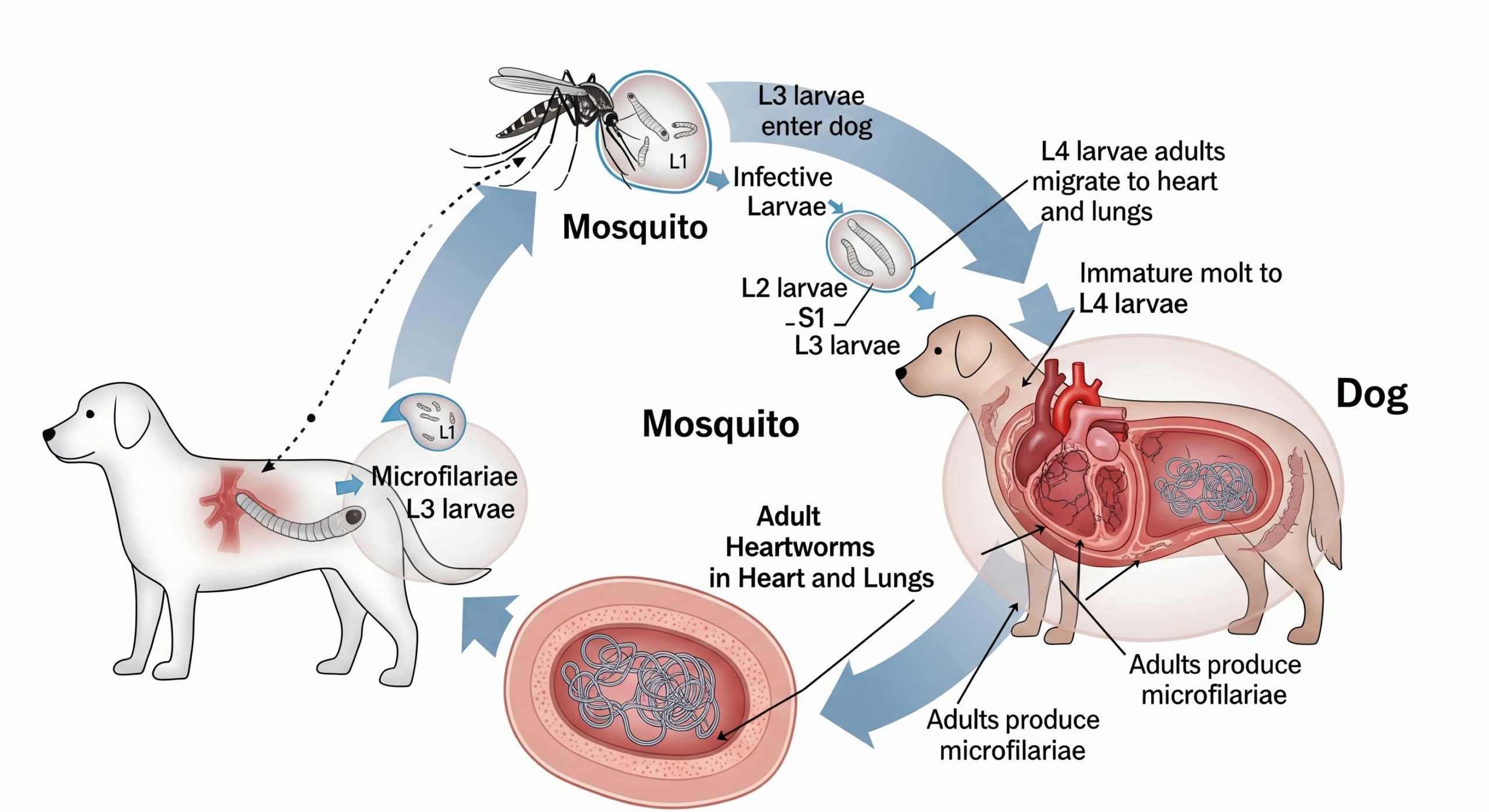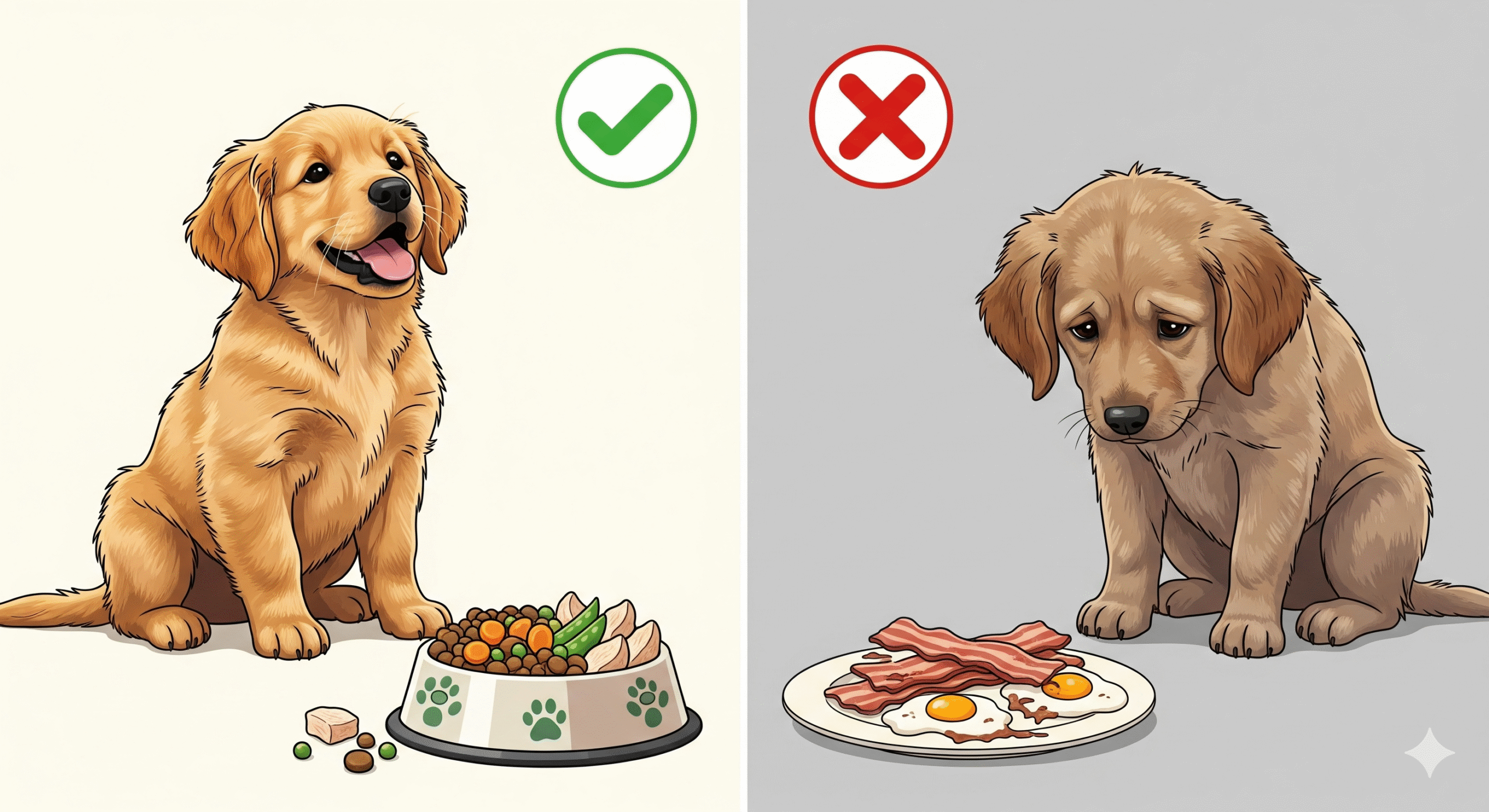Welcome to the incredible journey of puppy parenthood! Amidst the potty training, chewed slippers, and endless cuddles, there’s a crucial health responsibility that cannot be overlooked: heartworm prevention for puppies. This isn’t just another item on the puppy care checklist; it’s a fundamental pillar of ensuring your furry friend lives a long, healthy, and active life. 🐾
Heartworm disease is a severe, potentially fatal condition caused by foot-long worms that live in the heart, lungs, and associated blood vessels. The good news? It’s almost 100% preventable. This comprehensive guide will walk you through everything you need to know—from how puppies get heartworms to how to choose the right preventative and everything in between. Let’s ensure your puppy’s tail never stops wagging.
What Exactly is Heartworm Disease? 🦠
Understanding the enemy is the first step to defeating it. Heartworm disease is caused by the parasite Dirofilaria immitis.
The life cycle is complex but important to understand:
- Transmission: An infected mosquito bites a dog, cat, or other mammal, transferring microscopic baby worms (microfilariae) into the bloodstream.
- Maturation: Over about 6-7 months, these larvae mature into adult worms that reside in the heart, lungs, and pulmonary arteries.
- Reproduction: Adult worms can grow up to 12 inches long and can live for 5-7 years in a dog. They mate and release new microfilariae into the bloodstream.
- Spread: When a mosquito bites this infected dog, it ingests the microfilariae, which develop inside the mosquito for 10-14 days before becoming infectious larvae. The mosquito then bites another animal, and the cycle continues.
This process makes heartworm prevention for puppies absolutely critical, as mosquitoes are a ubiquitous part of the environment.
Why Puppies Are Especially Vulnerable 🐕
While all dogs are at risk, puppies require special attention for a few key reasons:
- No Natural Immunity: Puppies are born without any protection against parasites. Their immature immune systems make them ideal hosts for these invasive worms.
- Rapid Growth: A puppy’s body is changing and growing quickly. The stress of a heartworm infection can severely impact their development and cause disproportionate damage to their smaller hearts and lungs.
- The “Why Wait?” Misconception: Some owners believe they should wait until a puppy is older to start prevention. This is a dangerous myth. The American Heartworm Society recommends starting prevention no later than 8 weeks of age.
The Sobering Reality: Symptoms and Cost of Treatment 💔
The insidious nature of heartworm disease is that symptoms often don’t appear until the disease is advanced. Signs can include:
- A mild, persistent cough
- Reluctance to exercise or fatigue after moderate activity
- Decreased appetite and weight loss
- A swollen belly due to fluid buildup
Treatment for adult heartworms is possible, but it is expensive, complex, and hard on your dog. It involves a series of deep intramuscular injections of an arsenic-based drug, strict crate rest for months to prevent deadly complications from dead worms, and can cost $1,500 to $5,000 or more. Prevention, on the other hand, costs a fraction of that—typically $5 to $15 per month.
Your Action Plan: The Pillars of Puppy Heartworm Prevention 🛡️
Protecting your puppy is a multi-faceted approach. It’s not just about giving a monthly chewable; it’s about creating a comprehensive shield.
1. When to Start Heartworm Prevention ⏰
The golden rule is simple: Start at 8 weeks of age. There is no benefit to waiting. Your veterinarian will guide you through the process during your puppy’s first vet visit. Even if you adopt an older puppy who has never been on prevention, the first step is to get them tested and then start prevention immediately.
2. The Importance of a Heartworm Test 🧪
Before starting any preventative, a veterinarian must test for an existing infection. This is a simple blood test.
- Why it’s necessary: Giving prevention to a dog with an existing mature infection can cause a severe reaction as the microfilariae die off rapidly.
- The Puppy Loophole: Since it takes over 6 months for larvae to mature into adults detectable by a test, a puppy under 7 months old may test negative even if it was infected recently. This is why starting prevention early is so effective—it kills the larvae before they mature.
3. Choosing the Right Preventative Medication 💊
There are several safe and highly effective FDA-approved options. Your vet will help you choose the best one based on your puppy’s breed, size, and lifestyle.
Common Types of Preventatives:
- Monthly Chewables: The most popular option. These tasty treats (e.g., Heartgard Plus, Interceptor Plus) also often protect against other intestinal parasites like roundworms and hookworms.
- Monthly Topicals: Applied to the skin on the back of the neck (e.g., Revolution Plus, Advantage Multi). These can also repel or kill fleas and ticks.
- Injectable Prevention: An injection administered by a veterinarian every 6 or 12 months (e.g., ProHeart 6, ProHeart 12). This is a great option for owners who worry about forgetting a monthly dose.
A CRITICAL NOTE ON BREED: Some herding breeds (e.g., Collies, Shetland Sheepdogs, Australian Shepherds) can have a genetic mutation (MDR1) that makes them sensitive to high doses of ivermectin. This is not a concern with the low, safe doses used in FDA-approved heartworm preventatives like Heartgard. Always consult your vet to alleviate any concerns.
4. Consistency is Everything: Don’t Skip a Dose! 📅
Heartworm preventatives work retroactively. They kill the larvae that have infected your puppy in the past ~30-45 days. Missing or being late with a dose leaves a window open for larvae to mature. Set a recurring calendar reminder or alarm on your phone to ensure you never forget.
5. Year-Round Prevention is Non-Negotiable 🌨️☀️
Even if you live in a cold climate, year-round prevention is the standard of care. Weather is unpredictable, and mosquitoes can emerge during warm spells in winter. Furthermore, many preventatives also control intestinal parasites that pose a year-round risk to both pets and humans.
Beyond the Medication: Integrated Mosquito Control 🦟
While medication is the cornerstone of prevention, reducing your puppy’s exposure to mosquitoes adds an extra layer of security.
- Eliminate Standing Water: Regularly empty plant saucers, bird baths, clogged gutters, and children’s pools. Mosquitoes can breed in just a bottle cap of water!
- Avoid Peak Mosquito Hours: Dawn and dusk are when mosquitoes are most active. Adjust walk times accordingly.
- Use Pet-Safe Mosquito Repellents: Consult your vet before using any repellent sprays on your puppy. Some essential oils can be toxic to dogs.
Debunking Common Heartworm Myths ❌
- Myth: “My indoor puppy doesn’t need prevention.”
- Fact: Mosquitoes easily get inside homes. One bite is all it takes.
- Myth: “Heartworm isn’t a problem in my region.”
- Fact: Heartworm has been diagnosed in all 50 states. Changing climate patterns and pet travel have spread it everywhere.
- Myth: “I can just stop in the winter.”
- Fact: Year-round prevention is safer, simpler, and protects against other parasites.
Conclusion: An Ounce of Prevention is Worth a Pound of Cure
The path to protecting your puppy from heartworm disease is clear, straightforward, and overwhelmingly supported by veterinary science. By starting prevention at 8 weeks, testing annually, administering medication consistently every month, and practicing smart mosquito control, you are making one of the most important investments in your puppy’s long-term health.
The peace of mind that comes with knowing you are protecting your puppy from a devastating, preventable disease is priceless. Don’t wait—talk to your veterinarian today and make heartworm prevention for puppies a non-negotiable part of your care routine.

❤️ Call to Action (CTA): Have questions about your puppy’s specific needs? Schedule an appointment with your veterinarian today to discuss the best heartworm prevention option for your furry family member. Share this guide with a fellow puppy parent to help spread awareness and protect more dogs!
Plan for the Upcoming Months. The first vet visit is just the beginning. Staying on schedule with your puppy’s vaccinations is one of the most important things you can do to protect their long-term health. For a clear, month-by-month breakdown of what to expect and a checklist to keep you organized, your essential resource is: Puppy Vaccination Schedule: Month-by-Month.






